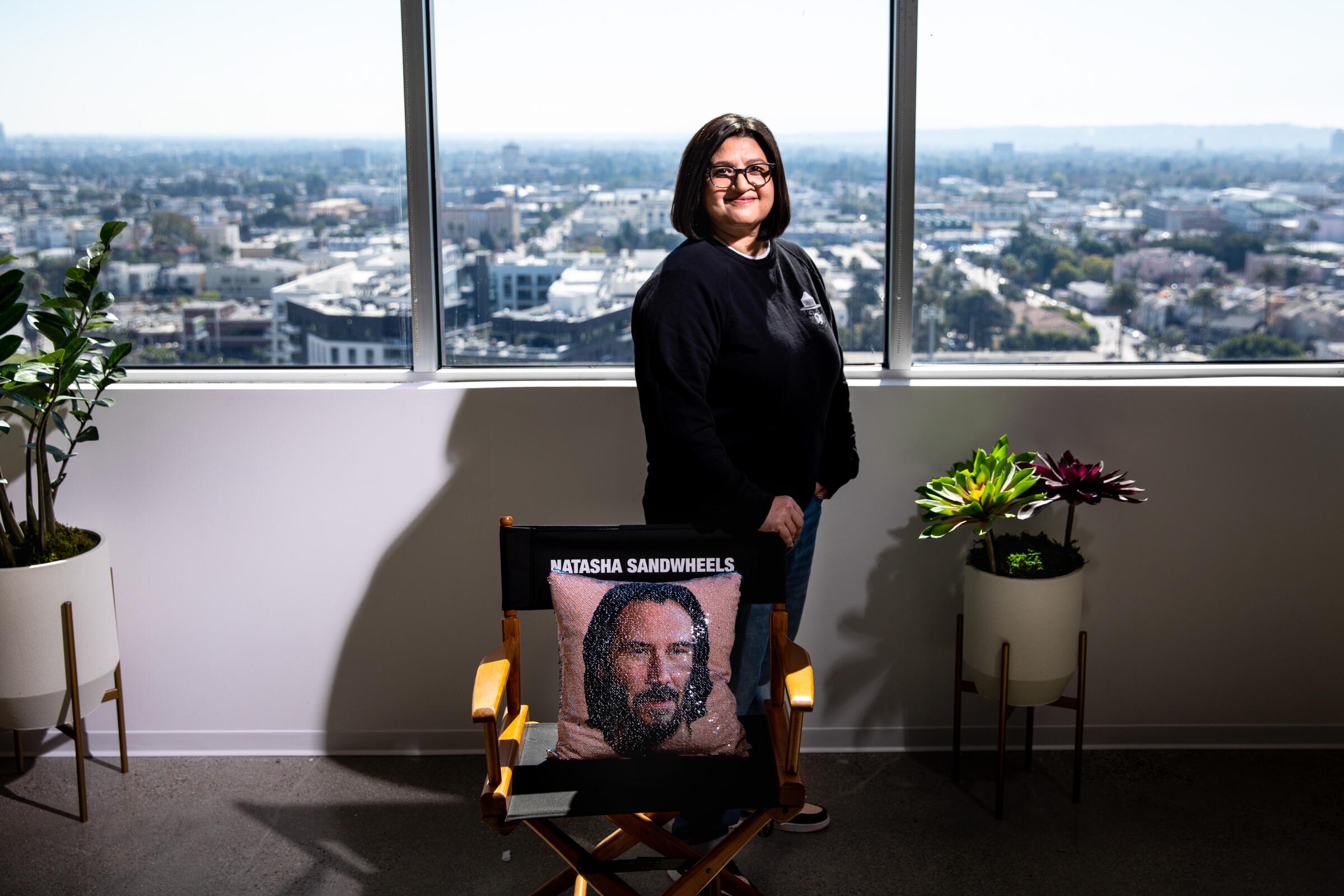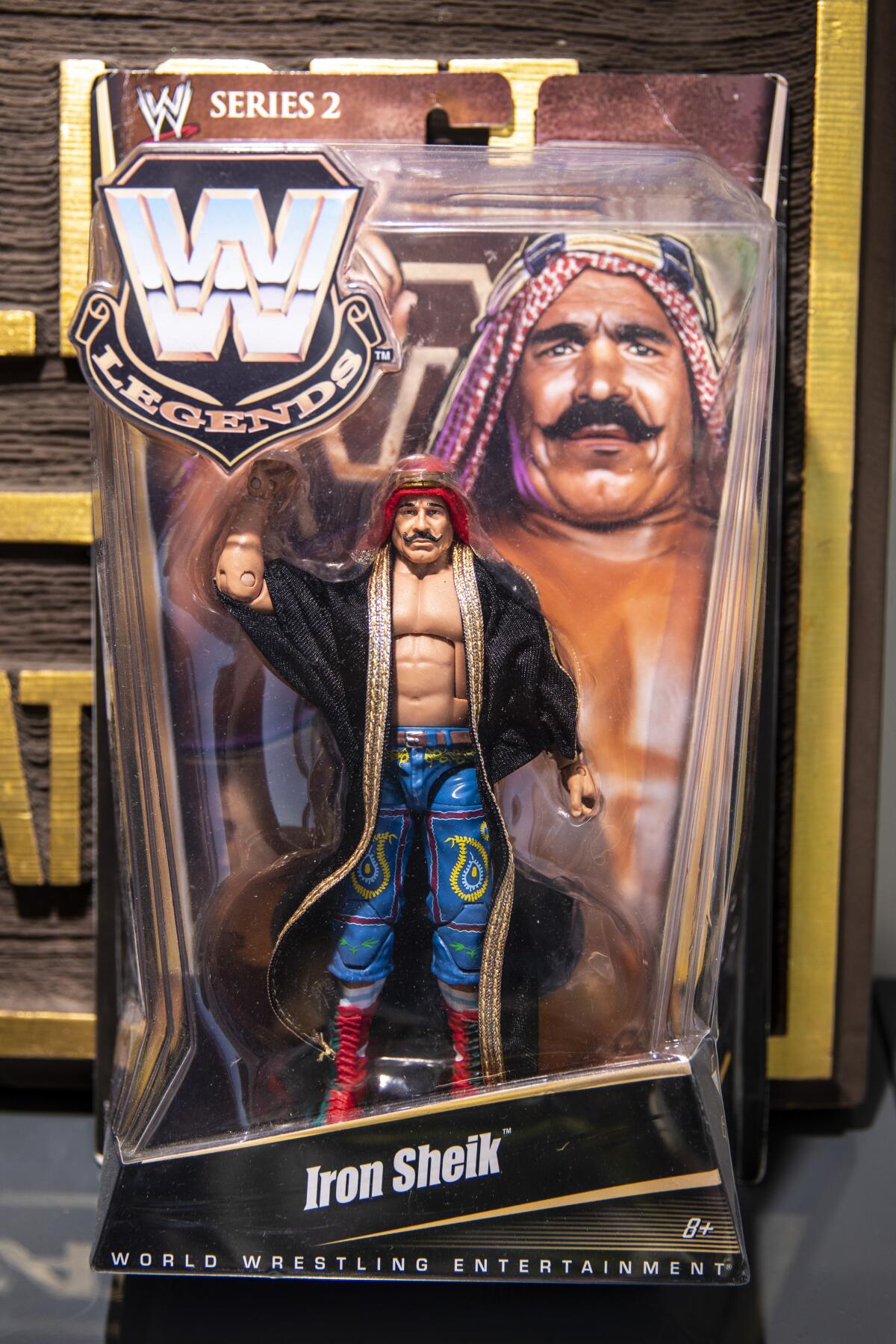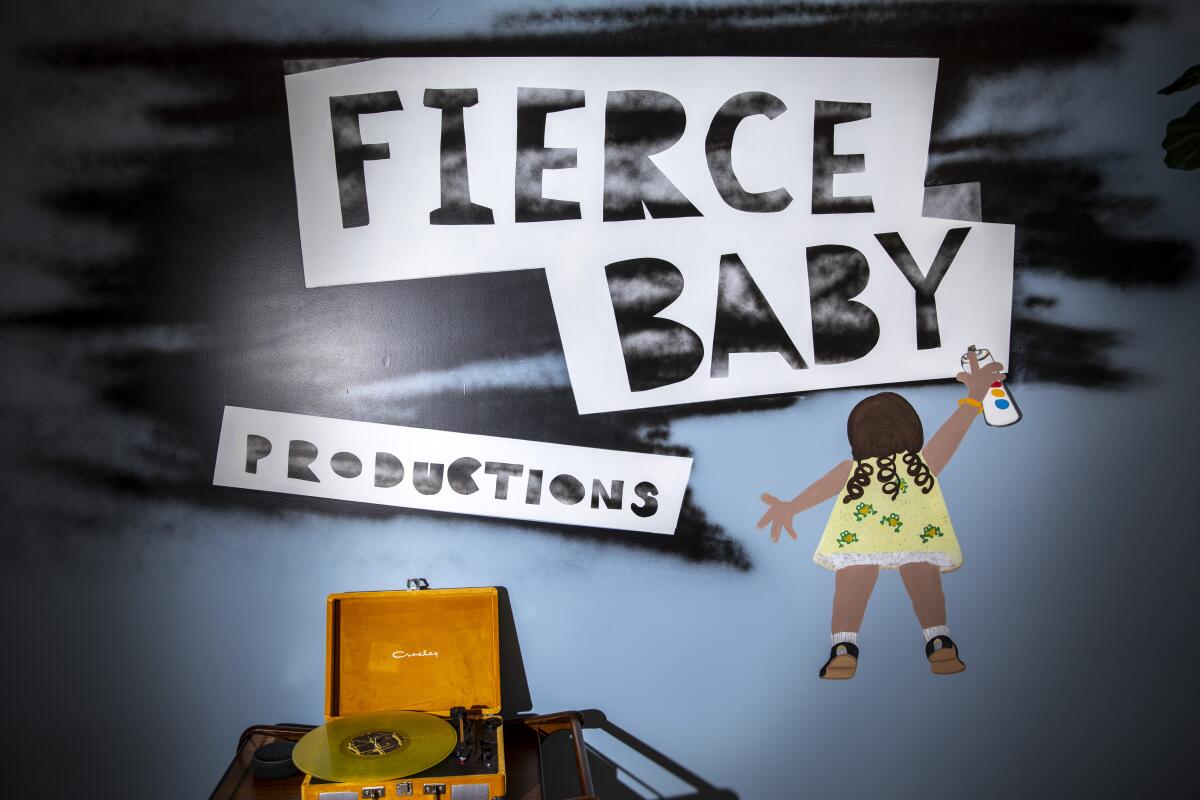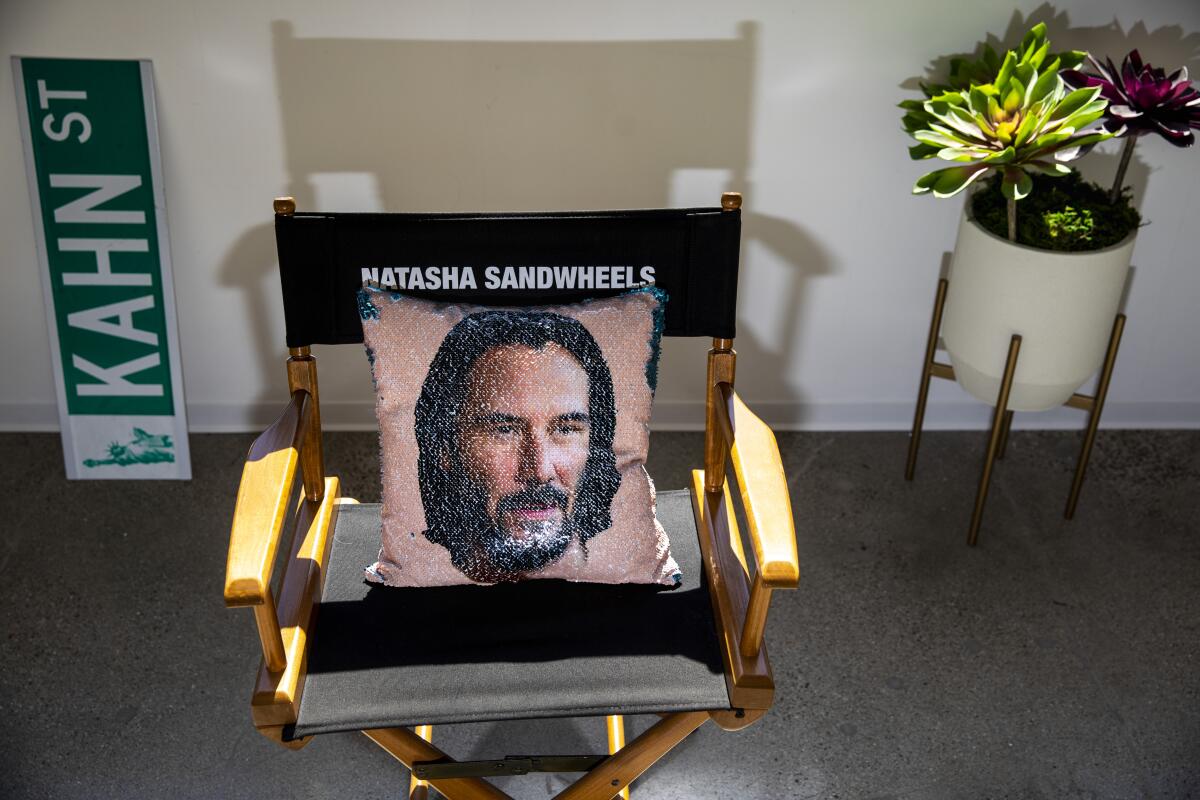The complete guide to home viewing
Get Screen Gab for everything about the TV shows and streaming movies everyoneâs talking about.
You may occasionally receive promotional content from the Los Angeles Times.

For Nahnatchka Khan, the showrunner of âYoung Rock,â few television programs of her youth evoke the visceral feeling that wrestling does.
Sure, the times her dad stirred her awake to watch classic films like âBen-Hur,â âGuys and Dollsâ and âCasablancaâ set the foundation for how she thought critically about storytelling and character building. But more memorable were the moments she would gather with her extended family, many of whom didnât speak English, to get lost in the rowdy world of professional wrestling â swept up in the theatrics of characters like Roddy Piper, Andre the Giant, Hulk Hogan and the Iron Sheik.
âItâs not like we could sit around and watch like âLaverne & Shirleyâ together, because they couldnât understand whatâs up,â Khan says. âBut we could all watch wrestling together because there is a spectacle there that they understood. They understood the storytelling. Itâs transcendent, in a way. That shared experience, to me, is what makes me so nostalgic when I look back on that time, in that era.â
Sheâs looked back at that era a lot with her latest project, âYoung Rock.â Inspired by the life of professional wrestler-turned-mega Hollywood star Dwayne âThe Rockâ Johnson, the NBC sitcom, which Khan created with Jeff Chiang, dramatizes Johnsonâs journey over four formative periods in his life â from his boyhood years marveling at his dad, a WWF star, and his wrestling friends to an imagined future presidential run. (Khan isnât the only family member whose childhood interest in pro wrestling has become part of her career: Her brother Nick, a former CAA agent, is now the president of WWE.)
Khan got her start in Hollywood writing for childrenâs television on ABCâs Saturday morning series, âPepper Ann.â She steadily built her TV rĂŠsumĂŠ from there, working on shows such as âMalcolm in the Middle,â âGood Morning, Miamiâ and âAmerican Dadâ before helming her own creations. Her first was ABCâs short-lived âDonât Trust the Bâ in Apartment 23â followed by the groundbreaking family sitcom âFresh Off the Boat,â which concluded last year with its sixth season.
Video-calling recently from her office in Hollywood, Khan talked about shooting in another country during a pandemic, her biggest regret from her days running âDonât Trust the Bâ,â and what itâs like getting frequent voice memos from The Rock. The following conversation has been condensed and edited for clarity.
Hollywoodâs most influential showrunners talk with The Times about how they broke into the business, the shifting TV landscape, their writing process and more.

With a sitcom featuring Johnson at various pivotal stages in his life, authenticity is key. And Johnson, who has no shortage of projects on his plate, has not been stingy with his time.
His medium [for giving notes,] which I have never encountered before, is audio notes. Heâll give voice memos with his thoughts, a pitch or just like talking about stuff or whatever. Iâve never had that. Heâs the first person to do it. I love it from him. I always get excited. Iâm like, âOh, voice memo from Dwayne.â He gave notes on scripts, gave notes on stories, on rewrites, he gives notes on cuts â heâs very much involved. And sometimes weâll just talk through some stuff if we have a couple of questions. I like to just check in with him anyway, so we have general check-ins. Heâs so incredibly busy, even in pandemic times. Heâs obviously one of the most famous people on the planet, one of the most industrious, so itâs great to have him be so focused on this.
The writers room for âYoung Rockâ opened a few weeks before lockdown restrictions in the U.S. shut down many film and TV productions. Then the staff transitioned to a virtual writersâroom.
When you come on to a Zoom, itâs like, âOK, letâs talk.â It feels so streamlined. But sometimes the creative process isnât about that. Itâs about getting coffee in the morning and chatting. And then walking to go get lunch or whatever â itâs those little moments in between that really sometimes unlocks things for you, even just casually. You get an idea. A virtual writers room, even if thereâs eight people in there, thereâs no side conversations, because you can only hear one part. So itâs not like two people can just have a chat about what they did last night. The energy is different. So I miss that. Like, the whole room doesnât need to hear this little conversation weâre having, but I want to be like, âOh, my God, did you see the âFraming Britney [Spears]â [documentary]?â Itâs doable, itâs possible to run a writers room that way, itâs just different. Thereâs an element thatâs missing. And I really cherish that element. Some people were like, âMaybe itâs gonna be virtual rooms for forever.â Maybe, but weâd really be missing out on a lot.
Because of lockdown restrictions in the U.S. that shut down many film and TV productions, âYoung Rockâ headed to Australia last fall to begin production. The sitcomâs set was at Screen Queensland Studios, but the comedy also shot on location in and around Brisbane and South East Queensland.
The COVID-19 protocols were obviously something that none of us had ever gone through, so we were sort of finding our way through that. Things you donât even think about â like going out scouting and the scout van, normally thereâs one big bus or whatever, and everybody goes, but now youâve got to only have a limited amount of people. So itâs just a whole new way of thinking about prep and shooting. Luckily, though, being down [in Australia], you can still do stuff with more extras than you can [in the U.S.]. But everybodyâs in their bubble, everybody gets tested. So it was sort of just understanding that and then once you embrace that, it becomes almost like second nature and then you can kind of refocus a little bit on the creative, which is what you want to do, right? You want to be sure that everybody is safe, but then you want to just be like, âOK, how do we get this done?â
Adrian Groulx, Bradley Constant and Uli Latukefu secured lead roles in NBCâs new comedy. The catch? All three are playing Dwayne âThe Rockâ Johnson.
âDonât Trust the Bâ in Apt. 23,â the misfit comedy starring Krysten Ritter as Chloe, a scammer roommate in New York, was the first series Khan created. Originally developed for Fox, it ultimately moved to ABC where it fizzled after two seasons in part because of a confusing release strategy. Beyond the controversy spurred by its title, staying true to the seriesâ eponymous bâ often proved to be a challenge on network TV.
I think it was probably an ongoing battle. Everybody was very supportive at ABC at the time of this show, but it is still a network show. So there was [the] broadcast standards thing that we were always coming up against. And we were the latest slot of the comedy block â we were a 9:30 show â but even with that, people were nervous. Itâs ABC, which was not known at the time for pushing the boundaries.
In the pilot, I remember we had a big back-and-forth about Chloe getting a kid drunk in order to get some information out of him. I donât even know how many rounds of edits and re-edits we did. Ultimately, we landed on, he canât drink on camera, but there could be empty bottles around. And then I think, like, the blow was that he could throw up, but you couldnât show that. We were going back and forth on what that sound effect was going to be and details of how much vomit â is it hitting the ground? It has to be just an audio joke. Iâm sure if I went back through every episode, thereâd be a story.
You have to follow your instinct. I love collaborating, I really do. And there are a lot of smart people that work at the studios and the networks. Doesnât mean you take every single note, but I think there are really good notes and really good feedback. But I do think that if there are things that feel wrong and things that feel like they will compromise the character or the story, thatâs the thing that you push back on. Even that sounds silly, that example of that kid drinking, but that was a story point. And that showed the audience that this woman will go there; she will do that.

Itâs not unusual for sitcoms to have episodes air out of order during their broadcast run â a network decision that is made for a variety of reasons even though it can be narratively confusing for viewers and creatively discouraging for the showâs writers. âDonât Trust the Bââ experienced such a rejiggering during its original run on ABC, which frustrated Khan. (The series can now be streamed on Netflix in its intended order.)
If I could do something again, if I could have a do-over, that would be one of the things that I would fight harder for: to air the episodes in the order that they were intended to be seen. Because whenever that decision came, I lost that fight when they started to play with the air order. And after we had this sort of arc with James [Van Der Beek] on âDancing with the Stars.â There was a whole thing that we were trying to do. So when we talk about lessons that you take forward into the next job, I took that into âFresh Off the Boat.â I remember early on, I heard some rumblings of like starting to switch around episode order and right away I was like, âNo, absolutely not.â And sort of just cut that off before it even really got momentum. The showâs either going to work or itâs not going to work but moving up and moving down â youâre just shuffling the deck. Just let the show be what it is.
There is still an awards season. And, as always, The Times will be right there to capture all of it, from those living in the spotlight to those working backstage on âThe Envelopeâ podcast.

After years of putting her narrative skills on the page, Khan made her directorial debut on Season 2 of âDonât Trust the Bâ.â Sheâd go on to direct two episodes of âFresh Off the Boatâ before making her feature directorial debut with Netflixâs âAlways Be My Maybe.â With âYoung Rock,â which navigates four timelines, it was important to Khan that she direct the pilot to set the tone she envisioned for the sprawling series.
It wasnât one of those secret things that I always wanted to do. But I think being a showrunner in television is very similar to being a director in features â a lot of those skill sets crossed over. Those two things feed each other. So going into directing with âAlways Be My Maybe,â I had the experience of being a showrunner. Because really, itâs about world-building. Whether itâs six seasons or two seasons or an hour and a half, youâre trying to introduce people into this world, to these characters and have them invest in the story and care. So for me, and for all my collaborators, itâs always about that and allowing other people to contribute. Itâs not a fiefdom. You hire talented people, let them bring their talent, let them contribute. And as the director, as the showrunner, your job is to not allow the boat to tip over, to know where youâre going, keep that tone steady. And allow other people to bring what they do best.
The complete guide to home viewing
Get Screen Gab for everything about the TV shows and streaming movies everyoneâs talking about.
You may occasionally receive promotional content from the Los Angeles Times.